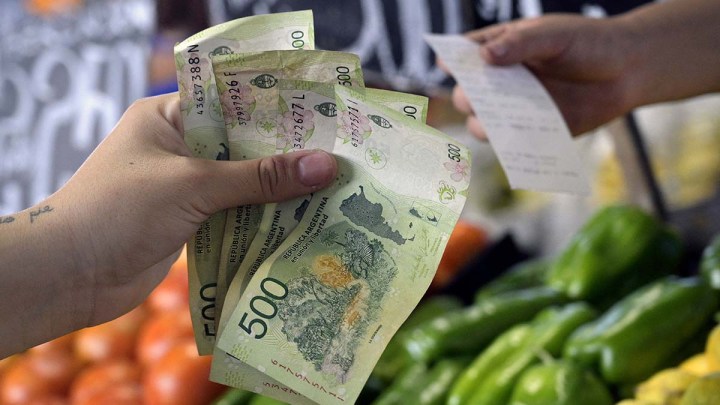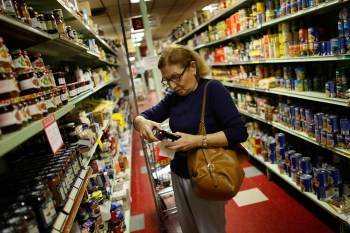
What Argentina’s inflation crisis says about trust in economic institutions
What Argentina’s inflation crisis says about trust in economic institutions

Argentina’s economy has been struggling for decades, but recently it hit another level of instability. In February, inflation rose more than 100% year over year for the first time since 1991. Prices across the board rose by almost 7% month over month.
The Argentine peso is so unstable that people either spend their cash quickly or convert it to American dollars, Emily Stewart of Vox wrote in a recent article. The Argentine government limits how many U.S. dollars people can buy, so they pay twice the rate on the black market for the “blue” dollar. Argentines living with this economic chaos have learned to distrust financial institutions like banks and currency.
“The thing about confidence in institutions is that once it’s lost, it’s hard to get it back,” wrote Stewart, who recently spent time in Argentina. She told “Marketplace” host Reema Khrais that “confidence and trust really underpin our financial system.” The following is an edited transcript of their conversation.
Reema Khrais: So I am fascinated by what is going on in Argentina. You lived there for several years. I know you were recently there. So I’d love to just start off with some of your general observations about how people in the country navigate the day-to-day economy.
Emily Stewart: So, I mean, for people who aren’t familiar, one kind of consistent issue with Argentina’s economy — at least over the past decades — is they have super high inflation. So to put this into some perspective, their annual inflation rate just hit 100%. Ours is 6%. So it’s very high. And so basically, what that means is you have to be pretty savvy to survive in the economy there, because your money obviously is constantly losing value. And so that looks like a lot of things. You know, most people keep their money, if they can, in [U.S.] dollars instead of pesos, to the extent that they can save. To be clear here: A lot of people are unable to save. The government makes it really difficult to get dollars. So most people wind up on the black market, which they call the “blue” dollar, a little bit counterintuitive. So to put this into, you know, some numbers, yeah, the official exchange rate is about 200 pesos to $1. The real exchange rate — the blue dollar rate — is nearing 400. So it’s really about double.
Khrais: Right, you write in the article, you’re making this point, which is that when you can’t trust the bank, the currency or anybody in charge, things can get pretty weird pretty fast. What are some of those weird things that you’ve observed?
Stewart: I mean, it is just a situation where people really do have a lot of cash. You know, I was there recently, a friend of mine sold his mother’s house for over $100,000. That deal was all in cash dollars. And he and his brother put some of the money into the bank. And now the plan is to take it out. They put the money in to make sure that the dollars were real. And they’re just kind of ways big and small, you know, that this kind of changes the way that you have to live. People will pay for things in a lot of installment plans, right? You do get discounts in cash a lot of the time there. And there’s sort of a tacit agreement that that’s because nobody’s paying taxes, right, you know, they have all different exchange rates. There are a lot of protests there a lot of the time. And some of that’s because unions and workers are constantly pushing for higher wages. It really is a situation of a wage-price spiral, right? Prices keep going up, people need their wages to go up, and their wages just don’t keep up.
Khrais: Yeah, it’s interesting. And then it feels like when you’re operating in this way, and you make this point in the article, which is that you can’t really think about the future. You’re not saving, you’re in this … you’re forever in the present.
Stewart: Right. You know, that was what one historian I talked to said to me was that, “You know, you can’t save, you can’t really think about the future.” And, you know, when I was living there, there were moments when the government would say, “It’s time to put your money in pesos, it’s time to put your money in pesos.” And, you know, I think a lot about, like, what if you did at that point, and now your money’s worth so much less? To put this into some context, when I moved to Argentina in 2008, the exchange rate was 3 to 1. That was 15 years ago, but that’s only 15 years, right? Like, that’s a huge amount of devaluation. And so, you know, I think sometimes in the U.S. and you know, other countries, we don’t think about what it really is like to not be able to trust that if you put your money in the bank, that it’s going to be there.
Khrais: Well, yeah, that leads into my next question. So obviously, we are not saying that what is going on in Argentina can be compared to what’s going on here. But what are the larger learnings? How can we use this case to think about our own economy?
Stewart: I mean, obviously, like you said, we can’t make a 1-to-1 comparison. But I think it really is important to remember that confidence and trust really underpin our financial system. You know, we can debate about whether it was a good idea for the federal government to bail out some of these banks that were in trouble, or whether or not it was a bailout, or if it’s a good idea for the [Federal Reserve] to loan money to banks, etc, etc. But at the same time, I think you have to play out the counterpoint of “What happens if people really can’t trust that their deposits are there?” Like, do we want to live in a world where people are hiding tens of thousands of dollars in their homes and in their mattresses? I think the answer there is no. We want to be able to trust our institutions and trust our banks, and it’s important to think about.
There’s a lot happening in the world. Through it all, Marketplace is here for you.
You rely on Marketplace to break down the world’s events and tell you how it affects you in a fact-based, approachable way. We rely on your financial support to keep making that possible.
Your donation today powers the independent journalism that you rely on. For just $5/month, you can help sustain Marketplace so we can keep reporting on the things that matter to you.

















